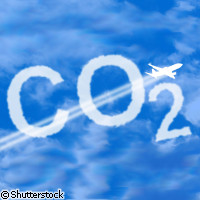EU green-lights airline emission cutbacks
Effective as of January 2012, airlines will be included in the EU Emissions Trading System (ETS). The European Parliament gave the measure the green light earlier this month, with 640 votes in favour, 30 against and 20 abstentions. All domestic and foreign flights operating in Europe will be affected by the cap-and-trade plan. Excluded from the plan are research flights, as well as small airline groups whose emissions are already minimal. During its first year of implementation, the measure effectively lowers the cap for the aviation sector to 97% of the average annual greenhouse emissions airlines released into the atmosphere in the period 2004-2006. The figure will drop again, down to 95% of those emissions, for 2013. It should be noted that the EU plans to sell 15% of the airlines' emission allowances. The European Parliament rapporteur on emissions, Peter Liese, said the ultimate objective is to secure a global agreement on this issue. He also made it clear that agreements with other countries would be the order of the day. An amended deal with the EU's neighbour across the Pond is also expected. 'We will have to wait until the US has elected a new president, called John McCain or Barack Obama, who takes climate protection seriously,' Mr Liese explained. While the measure has received acclaim from certain sectors of the community, a number of groups have expressed disdain. According to Giovanni Bisignani, the Director General and Chief Executive of the International Air Transport Association, the plan will trigger a number of 'international legal battles while adding new expenses to travel'. Mr Bisignani underlined that the airlines have already implemented measures to cut emissions and save fuel. What this plan does is 'put 7.6 million aviation-related European jobs at risk with higher costs', he said, adding that more than 130 countries have vowed to reject it. Meanwhile, in a research note released last March, a JP Morgan European Equity Research analyst said the majority of international airlines would comply with the rule so as to ensure its 'environmentally conscious' client base does not shrink. A proponent of the ETS is the UK Transport Committee, which outlined in its recent Freight Transport report that a number of issues, including competition and environmental concerns, cannot be 'left to the market'. Meanwhile, the head of the US Air Transport Association, James May, was more outspoken in his criticism of the trading system, expressing his view that the plan is a 'bad policy and illegal'. He also stressed that 'the EU's unilateral grab of power over the US and other non-EU airlines is a clear violation of the Chicago Convention '. A specialised agency of the UN charged with coordinating and regulating international air travel, the Convention establishes rules of airspace, aircraft registration and safety. It also exempts air fuels from tax. The European Commission noted that the potential for airlines to pass the costs of compliance to travellers, and not absorb them, is greater. The cost of roundtrip tickets, said the EC, could rise from as little as €4.60 to as much as €39.60. The price would factor in the length of the journey.



